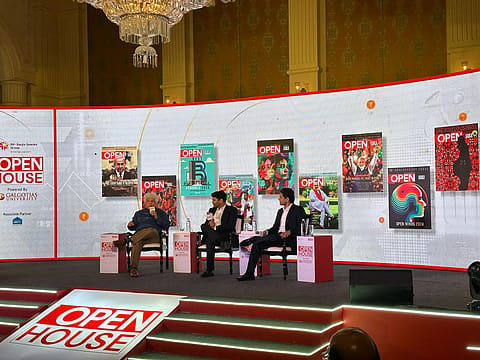OPEN House 2025: 'Energy transition, AI, policy key to India’s future'
Suhel Seth engages with Shashwat Goenka of RPSG Group, and Devansh Jain of INOXGFL Group in a discussion on India’s energy transition, policy consistency, AI innovation, and inclusive growth

At the 2025 edition of the OPEN House event of OPEN Media, businessman, author and columnist Suhel Seth in a chat with Shashwat Goenka, vice chairman of RPSG Group, and Devansh Jain, executive director of INOXGFL Group, discussed India’s game-changing energy transition, policy consistency, digital innovation, and wealth creation. They highlighted that AI, capital access, youth-driven growth, and lessons from business reinvention were key strategies for India’s prosperity.
"The game-changing move for India is the entire energy transition piece. With the recently announced National Clean Manufacturing Mission, Prime Minister Narendra Modi is trying to put India out there to become a global champion," said Jain,
With solar, wind or green hydrogen, it's an area where there will be the highest investments and it's where India's Top 10 conglomerates are investing, he said. "India could become a global champion in the entire energy transition space."
Talking about the Union Budget 2025-26, Goenka highlighted the country's youth population. "65% of our population is under 35. When you look at major economies of the world, the big boom they had was when they had that young population. When you look at this or previous Budgets, each one has built on the previous one with the same key pillars. That consistency in policy is what will drive us to Viksit Bharat by 2047."
Speaking about the RPSG Group's businesses, Goenka said: "The idea is how you reinvent each of these businesses, new and old, to cater to a new population of India. And whether it's AI or energy transition, each of businesses are transitioning in that space."
On the evolution of digital media and corporate India's ability to manage behavioural change, Jain said quality is the No. 1 criterion. "First, your product, which should be top-notch, or you are going to get trolled, and the product is dead. Second, your response to service needs to be instant."
Goenka, talking about learnings from the group's Indian Premier League (IPL) business and applying those to RPSG's consumer business, said: "There's a lot of learning from the sport itself--whether it's resilience, consistency in performance, looking at the bigger picture, and whether it's thinking as a team player. These are key learnings we have applied in our business. When you look at consumers, who are changing rapidly, you have to be at the cutting edge of the competition and technology."
On the changing landscape in terms of access to capital, Jain said that if one was a serious player, and was building a genuine project on the ground, it was not a challenge. "On the contrary, we are looking at a situation where everyone's balance sheets are fixed. Raising capital has become fairly easy. The banking system has been fixed to a great extent. MSMEs will get their fair share of dues with this Budget and announcements around MSMEs. We are on the path of very inclusive growth."
On West Bengal's performance in the business landscape, Goenka said the biggest thing the state needs is to stop the brain drain. "A lot of it is going to come from positive, good work that the state has been doing." He added that becoming competitive will allow the state to attract large investments. "Similar to our consumer businesses, everything is become competitive. You have to become better at product, service and delivery."
On the future course of action for India to retain top talent and make sure the country moves on the right path, Jain said given the stability this government has, it needs to fix the problem of pollution, which has made it difficult for younger people or top talent to stay in the country. Secondly, he hoped there would be no irrational tax mechanism, which would create problems for businesses creating wealth.
Goenka added that India will see a lot more wealth creation in the coming decade, not just for billionaires, but across the board. "Second will be an India where you'll start seeing opportunities across the country from both rural and urban. That is where India will truly get its prosperity," he said.
(INR CR)